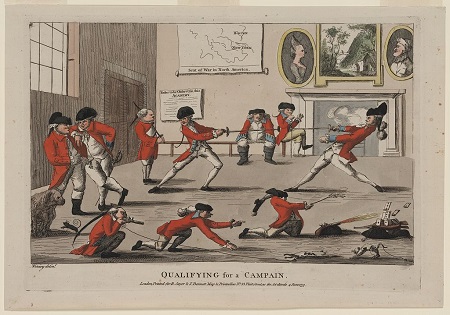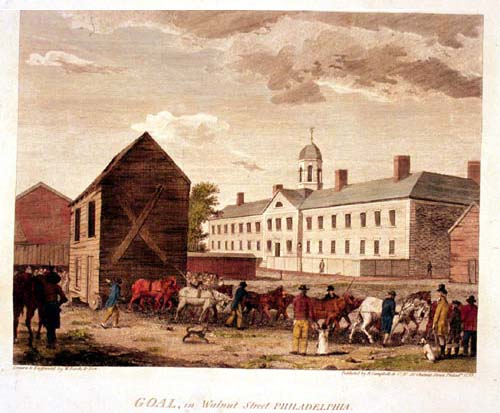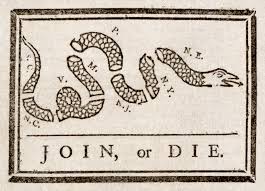Whitemarsh: Part 3 of 8

Printed by the London firm Robert Sayer and John Bennett
June 4, 1777.
Public Domain image from the Prints and Photographs Division of the
Library of Congress
This lampoon is entitled "Qualifying for a Campain." It shows British soldiers playing at silly war games. Throughout the American Revolution, criticism of the British army grew constantly. This cartoon links British misfortunes in America with an inadequate army. On the wall is a map entitled "Seat of War in North America."
Meanwhile, paroled British officers were shipped back to England, where the British had a seemingly endless supply of officers being pumped out of military schools.
Concurrently, Washington sent the Commissary of Prisoners, Elias Boudinot, to Philadelphia to look into prison conditions. All the rumors of British maltreatment proved shockingly true. American prisoners were living in unheated jail cells swarming with lice and other vermin. Many Americans starved, while some became desperate enough to eat shoe leather to survive.
Howe, busy with all the aspects of occupying a city, and satisfied with a prisoner exchange arrangement that benefited the British, was blithe to the pain of the American captives.
Baby, It's Cold Outside

The Walnut Street Goal(Jail)
William Russell Birch and Thomas Birch
Birch's Views of Philadelphia
Built sometime after 1770 by Robert Smith of Philadelphia Carpenters' Company, the prison was the locale of horrible deprivations during the War. In 1777, American prisoners died in droves from starvation or disease and were unceremoniously buried across the street in unmarked trenches in Washington Square. In 1778, after the Americans reoccupied Philadelphia, British prisoners were kept in the jail.
At Whitemarsh, many Americans were suffering also. Eating was never guaranteed, as food was scarce. Sometimes the soldiers supped on soup so thin as to be nearly translucent. Often the main ingredients in this mess were weeds.
Thomas Jones, Deputy Commissary General of Issues stationed at Whitemarsh wrote this desperate plea to another commissary officer in Lancaster.
The present is to advise you of the approaching calamity, which I expect here every moment. Not a single barrel of flour, I declare upon my honour, have I to deliver out to the troops this morning. I need not point out to you the distress I labor under, for Dog's sake exert yourself in this affair or all's over.
At night, the temperature had already started dipping into the 20's. Blankets and warm clothing were lacking. Shoes, for those lucky enough to have them, were worn to a near-translucent thinness. All-in-all they probably tasted better than the soup.
In desperation, Washington offered, in the General Orders of November 22, 1777, a reward of $10:
to any person who shall produce the best substitute for shoes made out of raw hides. The Commissary of Hides is to furnish the hides & the Major Genl of the Day is to judge the essays & assign the reward to the best artist.
It's not recorded who, if anyone, won the prize. It is known that less than a month later, hundreds of barefoot American soldiers left the snow red with trails of blood while marching to Valley Forge.
Though conditions were hard, Washington tried to make life in the camp as orderly and disciplines as possible. For instance, a post office opened. An announcement read, "the postmaster has paper to sell at the price he gave for it." Orders on the 9th, decreed that men on guard duty should be shaven, have their hair combed, and be in clean uniforms.
In the meantime, the cold, hungry, soldiers hadn't been paid for two months. Washington sent officers to various states begging for supplies and aid. They usually came back empty-handed.
The soldiers who could afford it entertained themselves by drinking. During the Whitemarsh encampment, the boozing appeared to be getting out of hand. The General Orders of November 24th ordered tippling houses suppressed. Operated by "divers of the late sutlers and some of the inhabitants," Washington threatened to confiscate the liquor being sold at these ad-hoc hooch houses and to "banish the sutlers from the army."



